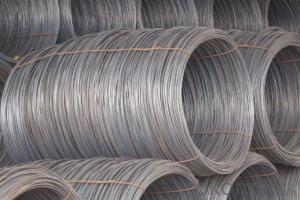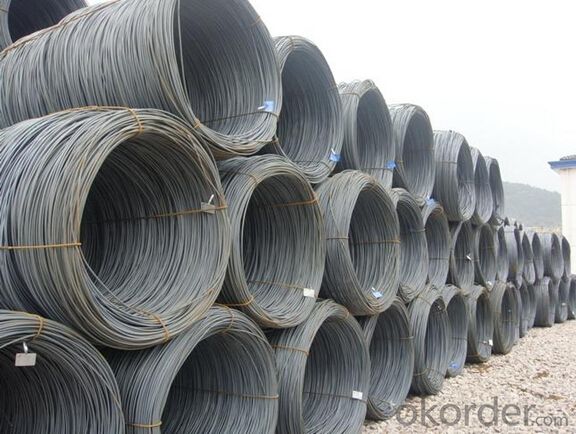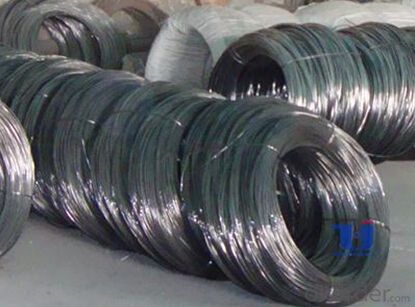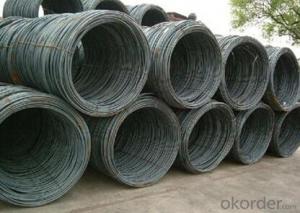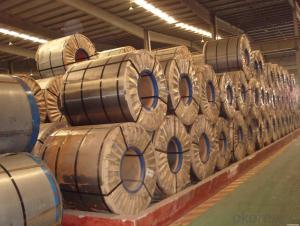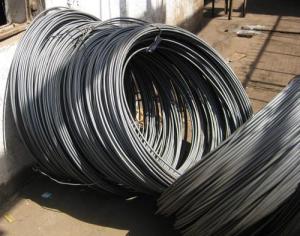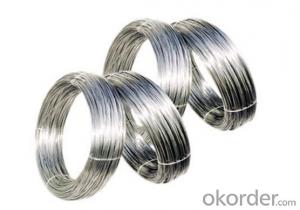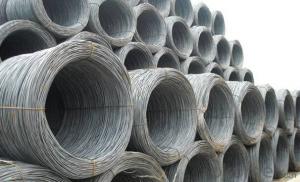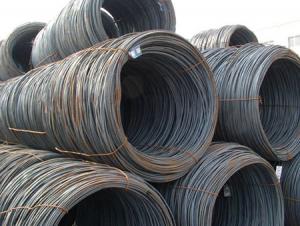Dia.8mm Grade SAE 1006 Coils Steel Wire Rod
- Loading Port:
- Tianjin
- Payment Terms:
- TT OR LC
- Min Order Qty:
- 10 m.t.
- Supply Capability:
- 10000 m.t./month
OKorder Service Pledge
OKorder Financial Service
You Might Also Like
Specification
Dia.8mm Grade SAE 1006 Coils Steel Wire Rod
Details of the Dia.8mm Grade SAE 1006 Coils Steel Wire Rod
| Steel Grade | Q195-Q235,Q235,SAE 1008-1018 Hot Rolled Steel Wire Rod |
| Diameter | 5.5, 6.5, 7,8, 9,10, 12,14mm.etc. |
| Coil weight | 2m.t. |
| Application | drawing, construction materials, machinery parts,construction for Houses, Bridges, Roads,Packing |
| Deliver Time | 25-30 days after receipt of L/C or deposit by T/T |
| Packing | In coils, loading in container or by bulk vessel |
| Payment terms | 1).100% irrevocable L/C at sight. |
| 2).30% T/T prepaid and the balance against the copy of B/L. | |
| 3).30% T/T prepaid and the balance against L/C |
| Chemical Composition(%) | ||||||
| C | Mn | Si | S | P | Cr | |
| SAE1006B | 0.03~O.07 | ≤0.32 | ≤0.30 | ≤0.045 | ≤0.040 | 0.3-0.35 |
| Mechanical properties | ||||||
| Yield strength(N/mm2) | Tensile strength(N/mm2) | Elongation(%) | ||||
| 250-280 | 350-380 | ≥32 | ||||
| Grade | Chemical Composition(%) | |||||
| C | Mn | Si | S | P | Cr | |
| SAE1008B | 0.10max | 0.3~O.50 | 0.15max | 0.050max | 0.040 max | 0.3-0.35 |
| Mechanical properties | ||||||
| Yield strength(N/mm2) | Tensile strength(N/mm2) | Elongation(%) | ||||
| ≥195 | 315-430 | ≥30 | ||||
Supplier of the Dia.8mm Grade SAE 1006 Coils Steel Wire Rod
CNBM International Corporation is the most import and export platform of CNBM group(China National Building Material Group Corporation) ,which is a state-owned enterprise, ranked in 270th of Fortune Global 500 in 2015.
With its advantages, CNBM International are mainly concentrate on Cement, Glass, Iron and Steel, Ceramics industries and devotes herself for supplying high quality series of refractories as well as technical consultancies and logistics solution.
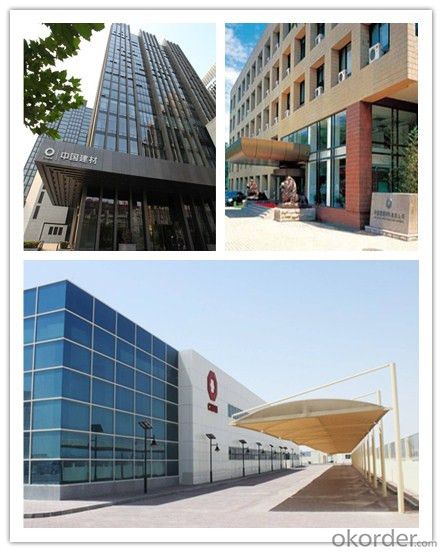
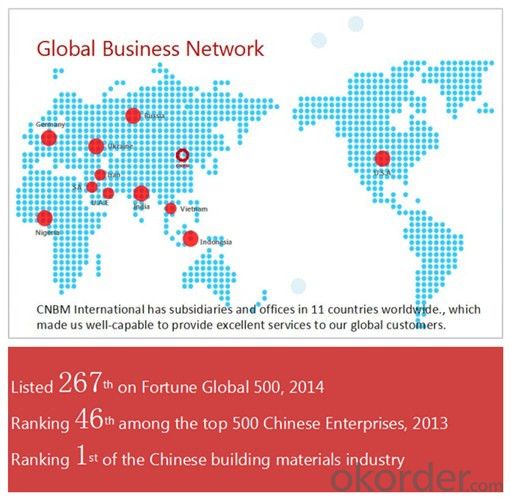
Delivery of the Dia.8mm Grade SAE 1006 Coils Steel Wire Rod
Packaging Detail | Sea worthy packing /as per customer's packing instruction |
Delivery Detail | 15 ~ 40 days after receiving the deposit |
Products Show
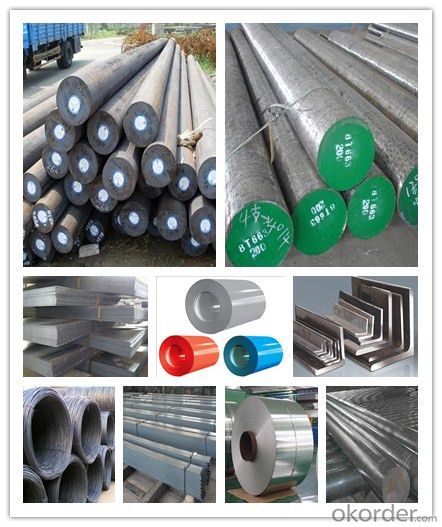
FAQ:
Are you a trading company or manufacturer? | Manufacturer |
What’s the MOQ? | 3 metric ton |
What’s your delivery time? | 15-35 days after downpayment received |
Do you Accept OEM service? | Yes |
what’s your delivery terms? | FOB/CFR/CIF |
What's the Payment Terms? | 30% as deposit,70% before shipment by T/T |
Western Union acceptable for small amount. | |
L/C acceptable for large amount. | |
Scrow ,Paybal,Alipay are also ok | |
Why choose us? | Chose happens because of quality, then price, We can give you both. Additionally, we can also offer professional products inquiry, products knowledge train (for agents), smooth goods delivery, excellent customer solution proposals. |
What's your available port of Shipment? | Main Port, China |
What’s your featured services? | Our service formula: good quality+ good price+ good service=customer's trust
|
Where are your Market? | Covering more than 160 countries in the world |
- Q: How does special steel contribute to the flexibility of products?
- Special steel contributes to the flexibility of products by providing enhanced strength, durability, and resistance to corrosion. Its unique properties allow manufacturers to design and produce products that can withstand high stress, extreme temperatures, and harsh environments. This flexibility enables the creation of a wide range of products that can be used in diverse industries, including automotive, aerospace, construction, and manufacturing.
- Q: What are the properties of shock-resistant alloy steel?
- Shock-resistant alloy steel is known for its exceptional toughness and ability to withstand high impact and shock loads. It possesses a unique combination of strength, hardness, and ductility, making it ideal for applications in industries such as aerospace, automotive, and manufacturing. This type of steel undergoes specialized heat treatment processes to enhance its shock-resistance, thereby ensuring it can absorb and dissipate energy without fracturing or deforming. Additionally, shock-resistant alloy steel exhibits excellent corrosion resistance and can maintain its mechanical properties even in harsh environments, making it a reliable and durable material for various demanding applications.
- Q: What are the applications of special steel?
- Special steel has a wide range of applications in various industries including automotive, aerospace, construction, energy, and machinery. It is used for manufacturing high-performance components and structures that require exceptional strength, durability, and resistance to corrosion, wear, and extreme temperatures. Some specific applications include engine parts, gears, bearings, cutting tools, pipelines, and building infrastructure.
- Q: How is alloy steel used in the production of gears and shafts?
- Alloy steel is used in the production of gears and shafts due to its high strength and durability. By adding different alloying elements such as chromium, nickel, and molybdenum, the steel's properties can be enhanced to withstand heavy loads, high temperatures, and wear. This makes alloy steel ideal for manufacturing gears and shafts that need to transmit power, resist deformation, and maintain their integrity under demanding conditions.
- Q: What are the main alloying elements used in special steel?
- The main alloying elements used in special steel include chromium, nickel, molybdenum, vanadium, and tungsten.
- Q: What are the different heat treatment processes used in special steel?
- There are several heat treatment processes used in special steel, including annealing, normalizing, quenching, tempering, and precipitation hardening. Annealing involves heating the steel to a high temperature and then slowly cooling it, which helps to relieve internal stresses and improve its ductility. Normalizing is similar to annealing, but the cooling process is done in still air, resulting in a more uniform grain structure. Quenching involves rapidly cooling the steel in a liquid, such as water or oil, to achieve high hardness and strength. Tempering is a process that follows quenching, where the steel is reheated to a specific temperature and then cooled, which reduces the brittleness and improves toughness. Lastly, precipitation hardening involves heating the steel to a high temperature and then cooling it quickly to form fine precipitates that enhance its strength.
- Q: What are the common failures or issues with special steel?
- Some common failures or issues with special steel can include brittleness, poor weldability, susceptibility to corrosion, and difficulty in heat treatment. Additionally, defects such as inclusions, voids, or cracks can also be observed, impacting the overall integrity and performance of the steel.
- Q: What are the cutting tools used for machining special steel?
- The cutting tools commonly used for machining special steel include carbide inserts, high-speed steel (HSS) drills, end mills, and broaches. These tools are specifically designed to withstand the high temperatures and hardness of special steels, ensuring precise and efficient cutting operations.
- Q: What is special steel? What is special steel?
- Special steel is the abbreviation of special steel, which is the most important factor in the steel industry of most industries in the national economy, such as machinery, automobile, military industry, chemical industry, household electrical appliance, shipping, traffic, railway and new industries.
- Q: What are the main factors affecting the fracture toughness of special steel?
- The fracture toughness of special steel can be affected by several key factors, encompassing: 1. Alloy composition: The fracture toughness of the steel can be greatly influenced by its specific chemical composition, including the type and amount of alloying elements. Elements like chromium, nickel, and molybdenum have the potential to enhance toughness by promoting the formation of fine-grained microstructures or improving the steel's ability to resist crack propagation. 2. Heat treatment: Determining the fracture toughness of the steel is heavily reliant on the temperature and duration of the heat treatment process, as well as the subsequent cooling. Proper heat treatment can refine the microstructure and eliminate any potential defects, thereby enhancing the steel's resistance to fracture. 3. Microstructure: The fracture toughness of the steel is profoundly impacted by its microstructure, encompassing grain size and distribution, phase composition, and the presence of inclusions. Generally, finer-grained structures exhibit higher toughness due to their improved resistance to crack propagation. 4. Existence of defects: The presence of defects, such as cracks, voids, or inclusions, within the steel can act as stress concentrators, ultimately diminishing its fracture toughness. These defects can initiate cracks and facilitate their propagation, ultimately leading to reduced toughness. 5. Temperature: Fracture toughness is contingent upon temperature, and the behavior of special steel can significantly vary at different temperature ranges. Some steels exhibit improved toughness at lower temperatures due to microstructural transformations, while others may experience decreased toughness at elevated temperatures due to material softening. 6. Loading conditions: The fracture toughness of special steel can also be impacted by the loading conditions, including the rate of loading or the presence of dynamic loading. Higher loading rates or dynamic loading can result in reduced toughness, as the steel may not have sufficient time to deform and absorb energy before fracturing. 7. Mechanical properties: The mechanical properties of the steel, such as strength, hardness, and ductility, can influence its fracture toughness. Higher strength and hardness can sometimes lead to decreased toughness, as the material becomes more brittle. However, a balance between strength and toughness can be achieved by carefully selecting the alloy composition and heat treatment parameters. In summary, the fracture toughness of special steel is determined by a complex interplay of various factors, including alloy composition, heat treatment, microstructure, defects, temperature, loading conditions, and mechanical properties. By optimizing these factors, the fracture toughness of special steel can be enhanced for specific applications.
Send your message to us
Dia.8mm Grade SAE 1006 Coils Steel Wire Rod
- Loading Port:
- Tianjin
- Payment Terms:
- TT OR LC
- Min Order Qty:
- 10 m.t.
- Supply Capability:
- 10000 m.t./month
OKorder Service Pledge
OKorder Financial Service
Similar products
Hot products
Hot Searches
Related keywords
